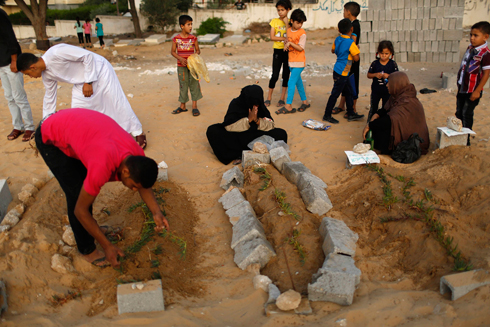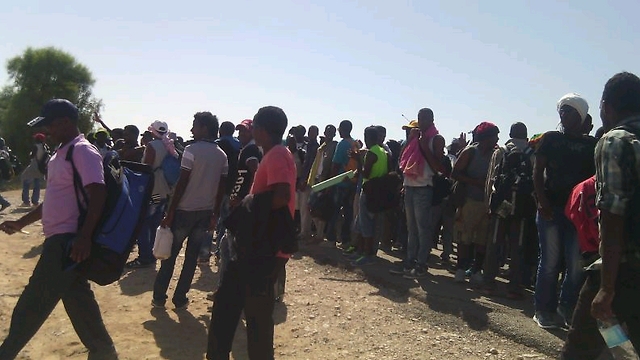
Lies in the service of Hamas
Op-ed: One can understand journalists who work in Hamas's service when they are coerced to do so; it's a little difficult to understand the repeated mistakes of 'rights groups' who operate free of coercion.
How many Palestinian were killed in Operation Protective Edge? The Palestinians say more than 2,000. And how many of them were civilians? During the course of the war, various organizations tried to create the impression that some 70 percent of the fatalities were civilians. This is the figure that appeared, for example, in a letter from human rights groups to Israel's attorney general.
Similar claims involving inflated numbers of civilian deaths appeared in the wake of Operation Cast Lead too – before Hamas Interior Minister Fathi Hamad came along and clarified that 700 of the 1,200-1,300 fatalities were Hamas personnel.
And then this week, it was none other than Palestinian Authority President Mahmoud Abbas himself, as reported by Palestinian Media Watch, who stated that 861 of the fatalities in Protective Edge were Fatah members, while just 50 were from Hamas. The squabble itself between Fatah and Hamas over who the fatalities belong to is of minor significance; the total number, of more than 900, carries much more weight.
It took a long while for the truth to come to light after Cast Lead. It was quicker this time. The conclusion is the same: Relying on sources that are dependent on Hamas is tantamount to propaganda and lies in the service of the organization. Time and again, the Israel Defense Forces publishes far more credible figures. One can understand journalists who work in the service of Hamas when they are coerced to do so; it's a little difficult to understand the repeated mistakes of "rights groups" who operate free of coercion.
* * *
The plaintiff, an Iranian citizen, was identified only by his number, S156. He had filed a petition against the immigration minister, challenging the Migration Act, which allows the state to indefinitely imprison unlawful foreign residents, and also to deport such individuals to a third country. The High Court heard the case, and, in an unprecedented ruling, upheld the act.
It happened in Australia. The ruling was published on June 18, 2014. Similar petitions have been filed in Israel too, in the wake of the law that permits sending illegals to an open detention center. The ruling is expected soon. There are differences between the countries. The detention center in Israel is an open one; in Australia, it's closed. Israel does not forcibly remove illegals to a third country; Australia most certainly does.
Israel's High Court of Justice rejected an earlier version of a law that permitted sending illegals to a detention center for three years. The illegals, migrant workers or refugees, deserve human rights. The question is how to afford them the rights and at whose expense. Those who are currently paying the price got together one evening this past week to break their silence, telling stories of violence and intolerable living conditions in areas in which the illegals have become the majority.
The law was amended. Detention at the facility was restricted to just a single year. A petition was again filed. The ruling is pending. The residents of south Tel Aviv, and other areas heavily populated with illegals, are readying for an influx. The rights groups activists had an excellent opportunity to show solidarity not only with Palestinians and foreigners, but also with Israel's weaker segments of the population. Yet they insisted, as usual, on fighting for the poor of another country, totally disregarding the poor of their city.
Why is the law so important? Because the fence along the Egyptian border isn't the only thing that has put the brakes on the infiltration, and the crime machine in its wake. There are fences around the Spanish enclaves in Morocco too, and large numbers storm them in the hope of getting over. Thousands drown trying to infiltrate Europe – 500 just last week.
There has been a dramatic increase both in the number of those who die trying and in the number of the infiltrators. How will Israel respond when hundreds are lined up alongside the fence on the Egyptian side? Two children will die of hunger. A petition will be filed in the High Court. The fence will be opened. Thousands will flow through again. And therefore, to stop infiltration there is need, too, for a law that makes it clear that infiltration doesn't guarantee paradise. The new law has already caused thousands to leave the country – not exactly willingly, but encouraged instead by the new law.
In the past, the High Court of Justice has shown empathy for the residents of Israel's weaker neighborhoods – nothing more than mere lip service. If the High Court acts in accordance with the demands of the rights groups, we're in for a social tragedy. The quality of life of the residents of south Tel Aviv has already been severely undermined. Someone has forgotten that they, too, are human beings. They, too, have rights. The current law, which deters illegals, is therefore preferable to a mortal blow to tens of thousands of veteran citizens. They can't take it any longer.
The Australians got it. Are the justices of the High Court capable of getting it too?
There's a humane solution to the problem of the illegals who are already in Israel and for whom there is no room in the detention facilities. As long as they have no country to return to, they need to earn a living; because if they don't do so, the crime rates and violence will only increase. To encourage them to leave willingly, a significant portion of their wages should be deducted and invested in a fund available to every worker the moment he or she leaves Israel.
After all, many of them, if not most, send huge sums of money, in terms of their countries of origin, to the families they left behind. Instead of sending the money, they will get it when they leave. And thus, the more time that goes by the greater the incentive to leave. Instead of policing and enforcement mechanisms, all the state's energies will go towards overseeing an arrangement that affords encouragement to leave and human kindness.
* * *
This week, thanks to the Unit 8200 soldiers' letter of refusal, Israel's left positioned itself on both sides of the divide.
On the one side stood Isaac (Buji) Herzog and Shelly Yachimovich, who denounced the refusal to serve. They may agree with some of the soldiers' gripes, but agreeing with gripes is not the same as agreeing with desertion or a refusal to serve.
On the other side stood Meretz leader Zahava Gal-On. She showered praise on the deserters. She didn't have the guts to utter a single word of condemnation or reservation. Things were different once. When Yossi Sarid served as party leader, he expressed a consistent, structured and well-reasoned position against refusal to serve in the military. His thoughts on the matter today remain unclear, because something bad has happened to him; he's no longer the same man. But as the leader of Meretz, his position was crystal clear. Ran Cohen, once a candidate for the chairmanship of Meretz, and one of its most prominent former leaders, has made it clear today that he, too, opposes politically motivated refusal.
Meretz was once a clear-cut Zionist party. It shared a common front with the Zionist Labor Party. Today, it shares a common front with the anti-Zionist Hadash party. One can only hope that despite Gal-On, Meretz remains a Zionist party. But its path is changing, and that's bad news for the Israeli left.
To dispel any doubts, refusal to serve should be denounced because it is a political standpoint. Refusal to obey an order, on the other hand, is a worthy cause in the event of a manifestly illegal order. Supporting refusal to serve is tantamount to supporting the politicization of military service. Every soldier would have a mandate to dictate his personal opinion – this one against the evacuation of outposts, and that one against guarding the outposts. That's not refusal; it's anarchy and abandonment. That's the road down which the rabbis of the extreme right are heading. Zahava Gal-On is joining them.
* * *
Clarification: I wrote last week about investigations into irregular activities during combat and war crimes, in Israel and other countries. I wish to add that the spokeswoman for the Yesh Din organization claimed that Attorney Michael Sfard was not referring to the United States but rather to Britain, where since 2010 an external and independent body is charged with investigating the actions of the British forces.












